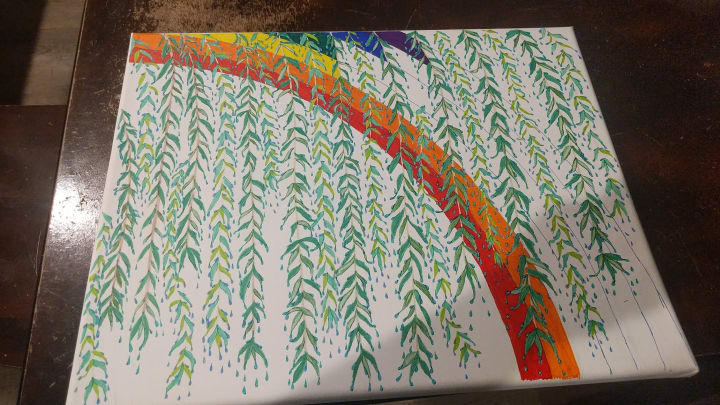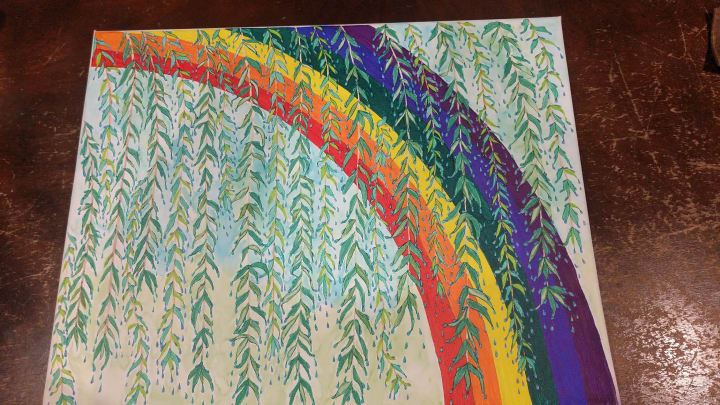 |
| Red Canyon displays the diversity of Earth |
Many times we look at ourselves in the mirror and only notice our physical appearance. We pick on one feature we dislike or preen at another feature we like. For me, I focus too much on my obesity. Yet, we often neglect to see ourselves as multidimensional--like a disco ball. We are so much more: our talents, weaknesses, memories, knowledge, thoughts, and feelings. We may take that perspective outward to judge others based on their most obvious characteristic too.
Indeed, we have let ourselves be categorized in so many ways by race, ethnicity, religion, political persuasion, beliefs, sexuality, gender expression, nationality, and so on. These categories can be useful to help us identify our past, our needs, our beliefs, and so on if we keep it in perspective that we are multi-dimensional human beings. The harm comes when we focus only on one identity of ourselves or one identity of another person.
Overview
- A mask says nothing about the person behind it.
- An obsession with race can lead to enmity, but it can be a jumping point to understand our heritage better.
- Labels for sexual orientation can lead to a greater personal understanding when kept in perspective.
- We need to love our personal diversity (including weaknesses) in order to love others.
- Growth comes from responsible reactions to a diversity of thought, culture, etc.
Only the Mask
This last year has taught us the preciousness of our physical bodies. We are taking so many actions to protect our physical bodies. However, we have judged one another based on the outward appearance of "obedience" to these actions. We judge a person on whether they wear a mask or not as if that determines their intelligence, political party, or religious affiliation.
We have taken this one measure to determine so much about a person. Some judge an unmasked person as being stupid, lazy, uncaring, disobedient, etc. Others judge the masked as woke, snobbish, liberal, unAmerican, stupid, etc. This piece of cloth tells us nothing about a person's character besides that they are wearing a mask.
We don't know their health history, their attitudes, their vaccination status, their compassion, or their political affiliation based on a mask.
But we can ask someone why they wear or don't wear a mask to understand them better. I know people who differ on mask-wearing for similar reasons.
Only Race
When we become hung up on race as a sole identifier, we may think our race is either superior or inferior. And we may view other races as either superior or inferior. Thus, enmity can distort our view that someone is an oppressor or a weakling, or it develops into self-hate or self-conceit. Either outcome denies the beauty of our personal and societal diversity.
Overall, we don't need to be prideful or humiliated by our skin color. Instead, we can let our skin color show us our heritage, our culture, and our human diversity. For example, I know my ancestors are most likely Northern Europeans because I am pale with freckles. Surprisingly, I also have some Semitic DNA (though my mom hasn't found a link in her family history research).
Sadly, sometimes certain characteristics have been attached to race. We may mistakenly associate whites with bigotry, blacks with stupidity, or Asians with excessive achievement. The list goes on. With any of these stereotypes, we create division with a member of our race or another race. When we look at more than skin color, we see a diversity of ideas too.
Our differences of experience, skin tone, and ideas provide us the opportunity to see new perspectives. Thus, diversity and opposition produce greater progress scientifically, spiritually, politically, or emotionally. Ultimately, it is part of our journey toward objective truth.
Only Sexuality
I recognized my occasional same-sex attraction since my junior year in high school but didn't have a label for it. In the 90s, only lesbian and gay labels floated as alternative sexual orientations. I still felt attraction toward males, so I knew I wasn't a lesbian. In the 2010s, I heard the label bisexual and asexual. Then I had a term for my sexuality: bisexual. It helped to have this label so I could process my sexuality as one of my many dimensions.
Some have an "us vs. them" mentality toward sexuality that focuses only on heterosexuality vs. LGBTQIA. Some straight people feel the need to identify as allies. Others call LGBTQIA the alphabet people (you have to admit the acronym keeps getting longer). This focus on only sexual identity creates division within our communities.
LGBTQIA individuals may feel alone, divided within themselves, or cluster in groups according to sexuality. Their allies and these individuals band together sometimes excluding those who disagree. Some persecute LGBTQIA individuals, whether intentional or not. In the end, both may resort to defensiveness. Hopefully, when we focus on loving the whole individual instead, the division and defensiveness will fall away concerning sexual orientation.
I know LGBTQIA individuals struggle to see themselves multi-faceted, which can lead to suicidal ideation. For example, David Archuleta had trouble even acknowledging his gayness to himself within his belief system, so he felt he needed to die by suicide. Sadly, he had difficulty seeing he could be gay and a Latter-day Saint Christian simultaneously (I know it's a tricky balance). He has a difficult road ahead of him, whatever path he takes. Plus, I am so glad he is still around.
Personally, I felt unity when I "came out" as bisexual to friends and family (I told my husband when I realized it myself). One sister was surprised, one sister knew it intuitively, one brother said he loved me, and my mom opined about the origin of my feelings, but all my family said they loved me. Then I shared my orientation on social media in a post about tribalism. No one commented on my sexuality. I felt unsure about that, but the non-reaction revealed to me that my friends and family view all of me already.
I hope others have similar social support. In my experience, it helps when relationships are rooted in more than one identity. In fact, having respect for disagreeing disagreeably makes a relationship stronger.
Love Yourself More Wholly to Love Others
Since self-hate often begins with thinking errors, it can be reversed through developing healthier thinking patterns.
I follow one person on Twitter who I notice can be harsh toward other people who profess different opinions (race, religion, culture, etc. don't play a factor). I wondered at her harshness until I saw a post about how she is harsh with herself. It clicked. Her frequent negative self-talk saps her energy to love herself and those ideologically different from her.
So how can we love ourselves more (to love others)? Truly, there isn't a one-size-fits-all answer. First, we need to remember we are intrinsic and eternal beings full of potential. Second, we need to address our physical needs--food, movement, sleep, needed medication, etc.--so our brains have the energy to rewire themselves. Finally, we can practice mindfulness, gratitude, and recognizing thinking errors (cognitive behavioral therapy). With practice, we can replace negative self-talk with realistic, kind, and positive self-talk.
The Value of Diversity
As humans we desire homeostasis--we don't want to rock the boat. But with the diversity within our own selves and the diversity of others combats that status quo. We cannot stay the same because we are in constant flux as we rub shoulders. Overall, we can use diversity, change, and opposition to create greater beauty.
We can let our beauty be like multi-faceted disco balls reflecting a rainbow of colors on each other and on the dance floor.
We are beautiful.











